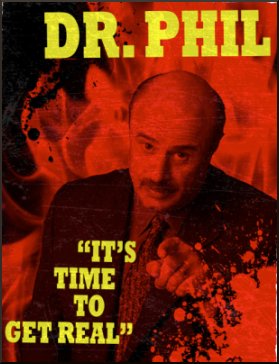
House the Homeless blog has been looking at the various ways in which veterans are denied their rights, a terrible situation which often results in homelessness and premature death. There are the enormously long waits before a case can be considered and acted upon. As we learned, workers in the Veterans Administration system have done disgraceful actions like shredding files.
Even when troubled vets are able to access the help they were guaranteed by the government, sometimes they sabotage their own treatment by not telling the whole truth about the extent of their symptoms (because they don’t want to be branded crazy) or by refusing to take their meds, for any number of reasons. Often, people who are mentally unbalanced don’t even realize how out of balance they are. This is part of the problem.
Activists put a lot of work into raising awareness, but sometimes the best intentions lead to trouble, as popular TV personality Dr. Phil (Phil McGraw) found out last spring. He aired a program designed to remind Americans that thousands of veterans, not only from Iraq and Afghanistan, but from Desert Storm and even the seemingly forgotten Vietnam conflict, are still suffering the effects of post-traumatic stress disorder on a daily basis.
A member of the public who entered the subsequent debate talked about how family members of PTSD victims “walk on egg shells,” always afraid they might say the wrong thing to the disturbed veteran who is their loved one. Dr. Phil encountered the media version of the same problem, making the very public mistake of titling this particular episode of his show, “From Heroes to Monsters?”
Despite the presence of a question mark, implying that the matter is not decided but is indeed under discussion, the host took heavy fire, with some elements of the veteran community demanding an apology. People called the episode’s title ignorant, unjustifiable, stigmatizing, insulting, and ratings-driven. On the other hand, the old Hollywood saying, “There’s no such thing as bad publicity,” might apply here. The well-publicized outrage served to get even more people talking about the issue.
Columnist Torrey Shannon, the wife of a 100% PTSD-rated combat veteran, was disappointed not only by the title, but by the advice given by Dr. Phil’s guest expert, Dr. Frank Lawlis, who wrote a book called The PTSD Breakthrough. He recommends chewing gum to relieve stress, though Shannon’s own internet research suggests that gum chewing is more likely to raise the person’s blood pressure and introduce artificial sweeteners of questionable value into the system.
Dr. Lawlis also recommends blue light bulbs, strong mouthwash, and colonic cleansing, none of which might be harmful in themselves, but which Shannon finds trivializing. She has little patience with the idea of yoga breathing exercises or participation in a drum circle, and is very upset by the suggestion of an ancient traditional method of self-healing, saying:
The book continues into dangerous territory by recommending a combat veteran with PTSD go on a vision quest, much like American Indians used to do. Vision quests require spending 7 days alone with no intake but water until a symbol appears in your consciousness.
However… such unconventional methods are also recommended by people who really, really do know what they are talking about, like Karl Marlantes, author of What It Is Like to Go to War, who believes that incorporating ritual and ceremony into a veteran’s return could truly make a difference. Many therapists are extremely impressed with the results obtained when PTSD victims are given the powerful psychedelic compound known as ayahuasca.
For a website called Healing Those Who Serve, Janice Arenofsky writes:
With the rise of psychological ailments among Iraq and Afghanistan War vets, military and VA hospitals have begun to rethink how they deal with this age-old scourge of war. Here is a rundown on six new methods of handling combat-related emotional trauma.
She proceeds to discuss acupuncture, meditation, music therapy, animal therapy, Emotional Freedom Technique, and Virtual Reality Treatment, all of which have been used by professionals. So, there is a lot going on in the PTSD recovery field of which Dr. Phil’s critics might not be aware.
Although Dr. Phil changed the controversial title of the episode before it was aired again, he remained adamant about the outrage he feels about the overall situation. According to the figures he found, for every battlefield death in the recent wars, there have been about 25 veteran suicides. Dr. Phil wrote for his online readers:
Some viewers expressed concern, and even disappointment, with the show’s original title… Our intent was to acknowledge the question so often cited in the media, not to make a statement, and to emphasize the severity of the pain and suffering our guests say they experience. I really wanted you to hear firsthand the effects that PTSD can have on war heroes and their families, and I’m grateful to our guests for being so candid and honest about their experiences.
One of Dr. Phil’s fans, by the way, in the comment section of his page offered information on The Soldiers Project, which the organization’s website describes like this:
We are a group of licensed mental health professionals who offer free psychological treatment to military service members (active duty, National Guard, Reserves and veterans) and their loved ones who have served or who expect to serve in the conflicts in Iraq or Afghanistan.
Source: “Regarding Dr. Phil’s ‘From Heroes to Monsters?’ Episode. Here’s Why America is Outraged, or Should Be!,” TorreyShannon.com, 04/21/12
Source: “Treating PTSD in Non-Traditional Ways,” HealingThoseWhoServe.org, 07/22/13
Source: “Heroes in Pain,” DrPhil.com, 04/25/12
Image by Keegan.


